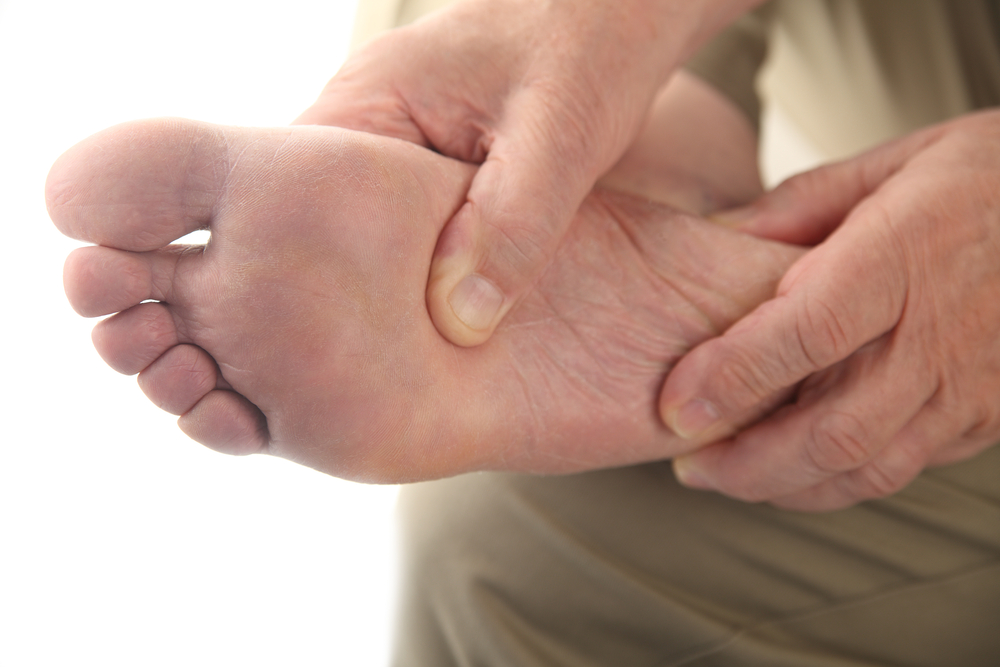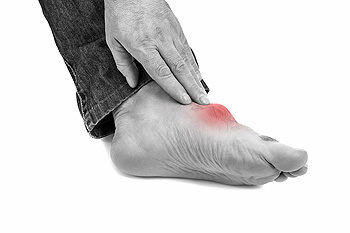December 2020
How Does Morton’s Neuroma Affect the Feet?
 Many people have general aches and pains in their feet. When pain develops in the ball of the foot, it may be indicative of a condition that is referred to as Morton’s neuroma. This is an ailment that affects the nerves in the feet that helps to avoid falling by maintaining balance. It develops as a result of inflamed nerves which can happen for a variety of reasons. These can include wearing shoes that do not fit correctly or from medical ailments consisting of bunions, hammertoe, and flat feet. Mild relief may be found when the affected foot is massaged, and it may be beneficial to wear custom made orthotics. If you have pain in this part of your foot, it is strongly suggested that you seek the counsel of a podiatrist who can properly diagnose and treat Morton’s neuroma.
Many people have general aches and pains in their feet. When pain develops in the ball of the foot, it may be indicative of a condition that is referred to as Morton’s neuroma. This is an ailment that affects the nerves in the feet that helps to avoid falling by maintaining balance. It develops as a result of inflamed nerves which can happen for a variety of reasons. These can include wearing shoes that do not fit correctly or from medical ailments consisting of bunions, hammertoe, and flat feet. Mild relief may be found when the affected foot is massaged, and it may be beneficial to wear custom made orthotics. If you have pain in this part of your foot, it is strongly suggested that you seek the counsel of a podiatrist who can properly diagnose and treat Morton’s neuroma.
Morton’s neuroma is a very uncomfortable condition to live with. If you think you have Morton’s neuroma, contact Dr. Robert Graser of Graser Podiatry and Bunion Surgery Institute. Our doctor will attend to all of your foot care needs and answer any of your related questions.
Morton’s Neuroma
Morton's neuroma is a painful foot condition that commonly affects the areas between the second and third or third and fourth toe, although other areas of the foot are also susceptible. Morton’s neuroma is caused by an inflamed nerve in the foot that is being squeezed and aggravated by surrounding bones.
What Increases the Chances of Having Morton’s Neuroma?
- Ill-fitting high heels or shoes that add pressure to the toe or foot
- Jogging, running or any sport that involves constant impact to the foot
- Flat feet, bunions, and any other foot deformities
Morton’s neuroma is a very treatable condition. Orthotics and shoe inserts can often be used to alleviate the pain on the forefront of the feet. In more severe cases, corticosteroids can also be prescribed. In order to figure out the best treatment for your neuroma, it’s recommended to seek the care of a podiatrist who can diagnose your condition and provide different treatment options.
If you have any questions, please feel free to contact our office located in Boerne, . We offer the newest diagnostic and treatment technologies for all your foot care needs.
What Can Cause Ankle Swelling?
Swelling in the ankles can be caused by conditions that specifically affect the ankle or by systemic conditions that affect the whole body. Often, the cause of swelling in an ankle is an injury, such as a strain or a sprain. Strains are the result of overstretched muscles or tendons in the affected area, whereas sprains occur when the ligaments in the ankle are overstretched or torn. Diseases of the joints, such as arthritis, can also lead to swelling in the feet or ankles. Pregnancy and obesity may lead to swelling in the ankles due to fluid retention and poor circulation. Treatment for swollen ankles will depend on what is causing the swelling. For more information, please consult with a podiatrist.
When dealing with systemic disease of the feet, it is extremely important to check the affected areas routinely so that any additional problems are caught quickly. If you have any concerns about your feet and ankles contact Dr. Robert Graser from Graser Podiatry and Bunion Surgery Institute. Our doctor will assist you with all of your podiatric needs.
Systemic Diseases of the Feet
Systemic diseases affect the whole body, and symptoms usually are displayed in the feet. This condition can make a patient’s ability to walk unbearable. Systemic diseases include gout, diabetes mellitus, neurological disorders, and arthritis.
Gout – is caused by an excess of uric acid in the body. Common symptoms include pain, inflammation, and redness at the metatarsal/phalangeal joint of the base big toe. Gout can be treated by NSAIDs to relieve pain and inflammation, and other drugs that lower the acid levels in the body.
Diabetes mellitus – is an increase in the level of blood sugar that the body cannot counteract with its own insulin. Failure to produce enough insulin is a factor in Diabetes.
Diabetes of the Feet
Diabetic Neuropathy – may lead to damaged nerves and affect the feet through numbness and loss of sensation.
Peripheral Vascular Disease – can restrict the blood flow to the feet, and often times lead to amputation of the feet.
If you have any questions please feel free to contact our office located in Boerne, . We offer the newest diagnostic and treatment technologies for all your foot and ankle needs.
Daily Foot Care for Diabetics
 Diabetes can leave the feet extra vulnerable to injury and infection. Because of this, it is important to take daily steps to keep your feet healthy. Check your feet every day for cuts, blisters, red spots, and swelling. Left untreated, damage to the skin of the feet can lead to the formation of diabetic foot ulcers, slow-healing wounds that can lead to complications like infection. Keep your feet clean and well-moisturized by washing them in room temperature water, drying them thoroughly, and then applying a cream or lotion. Trim your toenails straight across regularly to avoid ingrown toenails. For more information about caring for diabetic feet, please consult with a podiatrist.
Diabetes can leave the feet extra vulnerable to injury and infection. Because of this, it is important to take daily steps to keep your feet healthy. Check your feet every day for cuts, blisters, red spots, and swelling. Left untreated, damage to the skin of the feet can lead to the formation of diabetic foot ulcers, slow-healing wounds that can lead to complications like infection. Keep your feet clean and well-moisturized by washing them in room temperature water, drying them thoroughly, and then applying a cream or lotion. Trim your toenails straight across regularly to avoid ingrown toenails. For more information about caring for diabetic feet, please consult with a podiatrist.
Diabetic foot care is important in preventing foot ailments such as ulcers. If you are suffering from diabetes or have any other concerns about your feet, contact Dr. Robert Graser from Graser Podiatry and Bunion Surgery Institute. Our doctor can provide the care you need to keep you pain-free and on your feet.
Diabetic Foot Care
Diabetes affects millions of people every year. The condition can damage blood vessels in many parts of the body, especially the feet. Because of this, taking care of your feet is essential if you have diabetes, and having a podiatrist help monitor your foot health is highly recommended.
The Importance of Caring for Your Feet
- Routinely inspect your feet for bruises or sores.
- Wear socks that fit your feet comfortably.
- Wear comfortable shoes that provide adequate support.
Patients with diabetes should have their doctor monitor their blood levels, as blood sugar levels play such a huge role in diabetic care. Monitoring these levels on a regular basis is highly advised.
It is always best to inform your healthcare professional of any concerns you may have regarding your feet, especially for diabetic patients. Early treatment and routine foot examinations are keys to maintaining proper health, especially because severe complications can arise if proper treatment is not applied.
If you have any questions please feel free to contact our office located in Boerne, . We offer the newest diagnostic and treatment technologies for all your foot and ankle needs.
What Can Cause Gout?
 Patients who experience gout attacks are aware of the severe and debilitating pain this condition may cause. It is considered to be a form of arthritis and typically affects the joints in the big toe. Some of the symptoms that are generally associated with gout include swelling on or near the affected joints, and it may often feel warm when touched. Gout is caused by an excess of uric acid in the bloodstream, which is referred to as hyperuricemia. It may occur from genetic reasons, or from eating foods that have high levels of purines. These can consist of red meat, shellfish, and drinks that have an elevated sugar content. Additionally, existing medical conditions such as diabetes, high blood pressure, and poor kidney function, may play significant roles in developing gout. If you are afflicted with this type of arthritis, it is strongly suggested that you are under the care of a podiatrist who can effectively treat this condition.
Patients who experience gout attacks are aware of the severe and debilitating pain this condition may cause. It is considered to be a form of arthritis and typically affects the joints in the big toe. Some of the symptoms that are generally associated with gout include swelling on or near the affected joints, and it may often feel warm when touched. Gout is caused by an excess of uric acid in the bloodstream, which is referred to as hyperuricemia. It may occur from genetic reasons, or from eating foods that have high levels of purines. These can consist of red meat, shellfish, and drinks that have an elevated sugar content. Additionally, existing medical conditions such as diabetes, high blood pressure, and poor kidney function, may play significant roles in developing gout. If you are afflicted with this type of arthritis, it is strongly suggested that you are under the care of a podiatrist who can effectively treat this condition.
Gout is a painful condition that can be treated. If you are seeking treatment, contact Dr. Robert Graser from Graser Podiatry and Bunion Surgery Institute. Our doctor will treat your foot and ankle needs.
What Is Gout?
Gout is a form of arthritis that is characterized by sudden, severe attacks of pain, redness, and tenderness in the joints. The condition usually affects the joint at the base of the big toe. A gout attack can occur at any random time, such as the middle of the night while you are asleep.
Symptoms
- Intense Joint Pain - Usually around the large joint of your big toe, and it most severe within the first four to twelve hours
- Lingering Discomfort - Joint discomfort may last from a few days to a few weeks
- Inflammation and Redness -Affected joints may become swollen, tender, warm and red
- Limited Range of Motion - May experience a decrease in joint mobility
Risk Factors
- Genetics - If family members have gout, you’re more likely to have it
- Medications - Diuretic medications can raise uric acid levels
- Gender/Age - Gout is more common in men until the age of 60. It is believed that estrogen protects women until that point
- Diet - Eating red meat and shellfish increases your risk
- Alcohol - Having more than two alcoholic drinks per day increases your risk
- Obesity - Obese people are at a higher risk for gout
Prior to visiting your podiatrist to receive treatment for gout, there are a few things you should do beforehand. If you have gout you should write down your symptoms--including when they started and how often you experience them, important medical information you may have, and any questions you may have. Writing down these three things will help your podiatrist in assessing your specific situation so that he or she may provide the best route of treatment for you.
If you have any questions, please feel free to contact our office located in Boerne, . We offer the newest diagnostic and treatment technologies for all your foot care needs.
Blog Archives
- April 2024
- March 2024
- February 2024
- January 2024
- December 2023
- November 2023
- October 2023
- September 2023
- August 2023
- July 2023
- June 2023
- May 2023
- April 2023
- March 2023
- February 2023
- January 2023
- December 2022
- November 2022
- October 2022
- September 2022
- August 2022
- July 2022
- June 2022
- May 2022
- April 2022
- March 2022
- February 2022
- January 2022
- December 2021
- November 2021
- October 2021
- September 2021
- August 2021
- July 2021
- June 2021
- May 2021
- April 2021
- March 2021
- February 2021
- January 2021
- December 2020
- November 2020
- October 2020
- September 2020
- August 2020
- July 2020
- June 2020
- May 2020
- April 2020
- March 2020
- February 2020
- January 2020
- December 2019
- November 2019
- October 2019
- September 2019
- August 2019
- July 2019
- June 2019
- May 2019
- April 2019
- March 2019
- February 2019
- January 2019
- December 2018
- November 2018
- October 2018
- September 2018
- August 2018
- July 2018
- June 2018
- May 2018










